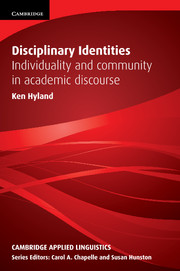Book contents
- Frontmatter
- Contents
- Series editors’ preface
- Preface
- Acknowledgements
- Notes on corpora and abbreviations
- 1 Identity: Interaction and community
- 2 Discipline: Proximity and positioning
- 3 Investigating identity
- 4 Identity in representational genres
- 5 Self-representation in academic bios
- 6 Culture: Authority and visibility
- 7 Reputation: Individuality and conformity
- 8 Gender: Disciplinarity and positioning
- 9 Identity, disciplinarity and methodology
- Appendix: Items with potential metadiscourse functions
- References
- Name Index
- Subject Index
2 - Discipline: Proximity and positioning
Published online by Cambridge University Press: 09 February 2023
- Frontmatter
- Contents
- Series editors’ preface
- Preface
- Acknowledgements
- Notes on corpora and abbreviations
- 1 Identity: Interaction and community
- 2 Discipline: Proximity and positioning
- 3 Investigating identity
- 4 Identity in representational genres
- 5 Self-representation in academic bios
- 6 Culture: Authority and visibility
- 7 Reputation: Individuality and conformity
- 8 Gender: Disciplinarity and positioning
- 9 Identity, disciplinarity and methodology
- Appendix: Items with potential metadiscourse functions
- References
- Name Index
- Subject Index
Summary
In the previous chapter I tried to show that we produce and reproduce an identity through our repeated interactions as members of social groups. Identity is a person’s relationship to his or her social world: it is a joint, two-way production, and language allows us to create and present a coherent self to others because, over time, it ties us into webs of common sense, interests and shared meanings. Who we are and who we might be are therefore built up through participation and linked to situations, to relationships and to the language we use in engaging with others on a routine basis.
Communities based around occupation, recreation, family and so on thus provide meaningful reference points and so help shape collective definitions of identity within their frameworks of understandings and values. In academic contexts, disciplines provide such reference points. They are places where participation involves communicating, and learning to communicate, in appropriate ways, and membership depends on displaying the ability to communicate as an insider: using language to represent ourselves as legitimate members. But while individuals enact who they are only in their dealings with others, they all bring different experiences, inclinations and proclivities to their performances as academics, teachers and students. Disciplinary membership, and identity itself, is a tension between conformity and individuality, between belonging on the one hand and individual recognition on the other. In this chapter I introduce the terms proximity, to refer to the first of these, the relationship between the self and community, and positioning to talk about the second, the relationship between the speaker and what is being said, as a way to begin unpacking these tensions. First, though, I want to establish the idea of discipline as a rhetorical community and site of identification.
What is a discipline?
Discipline is a common enough label, used to describe and distinguish topics, knowledge, institutional structures and individuals in the world of scholarship. While emergent multi-focused and practitioner-based fields may challenge conventional notions of academic disciplines, students and academics themselves typically have little trouble in identifying their allegiances (Becher and Trowler, 2001).
- Type
- Chapter
- Information
- Disciplinary IdentitiesIndividuality and Community in Academic Discourse, pp. 22 - 44Publisher: Cambridge University PressPrint publication year: 2012
- 1
- Cited by

